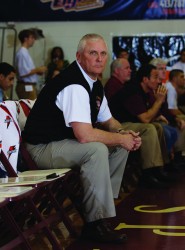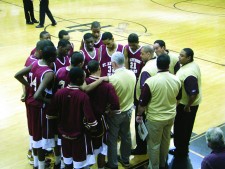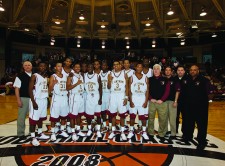Hurley’s Heroics

Editor’s Note: This article appeared in the September/October 2008 issue of Winning Hoops.
Read to the end of the article to see the movie trailer for last year’s “The Street Stops Here, which opened a year ago about Hurley and his basketball program.Drugs and drive-by shootings are part of the fabric of Jersey City, N.J. Single- and no-parent homes are the norm. Kids turn to gangs for support and a sense of purpose but they offer the wrong kind of both. Hope seems much farther away than the other side of the Hudson River where New York City sits. It’s hardly the place where you expect teenagers to thrive and excel in any walk of life…let alone the classroom or on the basketball court. But, expectations are not a problem at St. Anthony’s High School. A parochial school of 260 students that opened in 1952 (and still resides in the original building), expectations are a way of life.
Young people come to this school to learn, to grow, to mature and to play some serious basketball. Head Coach Bob Hurley knows the basketball court is a way to keep youngsters out of the criminal court system but it also pales in comparison to the education students are receiving at St. Anthony’s, which is why his focus is to improve all areas of their lives, not just their jump shots.
“Our team is an avenue to get players more education, says Hurley. We use basketball as a tool. Our players earn scholarships to college to continue their education. It’s education that helps them excel in life. Six of our seniors went on to earn Division I scholarships last year with one earning a Division II scholarship and another getting a half scholarship (he’s now going to a prep school).”
The Long Road To The Court
Of course, it’s not as simple as walking into St. Anthony’s and walking out with an education, scholarship and basketball pedigree. The school itself is struggling to keep the doors open every year as costs far outweigh the income. And, ever since the September 11 attacks, donations are down, and so too is enrollment as people simply don’t have the money to send their children to St. Anthony’s in today’s economy.
“These are not rich kids. The tuition is $4 000 a year but it costs $8 000 a year to educate each student, Hurley explains. You find yourself more involved in the lives of the kids and the future of the school because the school is needy. We’re worried about how these kids are going to pay tuition and how we are going to keep the doors open, which is why it feels so good to have the players I do. These are kids who want to play and are hungry to learn. They just need a chance.”
Hurley provides them with that chance to leave behind the old neighborhood and potentially troublesome friends. At St. Anthony’s, players are in a new atmosphere and community. They don’t have to act tough to fit in and they can be comfortable learning and furthering their education.
“We give them a chance to be who they want to be with no outside peer pressure from the neighborhood, Hurley says. Our faculty is dedicated and teaching is what they want to do with their careers, so everyone wants to be here.”
 The journey at St. Anthony’s is a two-way street as Hurley expects more from his players than most coaches might. He must due to the situation from where most of the players come. Those expectations are filtered through a myriad of team rules (see sidebar). Players must follow all the rules or face strict consequences or counseling. Being part of the St. Anthony’s basketball team has become a privilege. What player wouldn’t want to play for a squad that has a chance to win a state title every year, earn national recognition and dominate on the court?
The journey at St. Anthony’s is a two-way street as Hurley expects more from his players than most coaches might. He must due to the situation from where most of the players come. Those expectations are filtered through a myriad of team rules (see sidebar). Players must follow all the rules or face strict consequences or counseling. Being part of the St. Anthony’s basketball team has become a privilege. What player wouldn’t want to play for a squad that has a chance to win a state title every year, earn national recognition and dominate on the court?
A System Of Success
Hurley came to St. Anthony’s in 1968 and coached the freshman team. Two years later he took over the junior varsity team and in 1973 he moved into the position he now has occupied for the last 35 years. St. Anthony’s had won state titles in 1968 and 1969, so Hurley did have some recent success upon which to build.
He said he decided to “raise the bar” and play all schools at all levels. When he took over, St. Anthony’s was a “C” level school based on size. In 1980 New Jersey eliminated “C” and now it’s just “A” and “B” levels. Of course, none of this mattered to Hurley as he took on New York City teams while traveling the area, and the country, to build his team’s cohesiveness, as well as their stature in the basketball world.
 “Taking trips together brings a team together, Hurley says. In 1980, we took our first team to Las Vegas. It expanded those kids’ world at the time.” Hurley says now the holiday trip is part of life at St. Anthony’s. With donations low and fund-raising difficult for the school itself, the basketball team is pushed even harder to raise money for these trips. But, Hurley believes getting these players out of Jersey City and into different regions of the country is critical to their overall success as a team and in life. Hurley says it’s much more important for these players to take part in a holiday tournament out of state than wear flashy, new uniforms every few years.
“Taking trips together brings a team together, Hurley says. In 1980, we took our first team to Las Vegas. It expanded those kids’ world at the time.” Hurley says now the holiday trip is part of life at St. Anthony’s. With donations low and fund-raising difficult for the school itself, the basketball team is pushed even harder to raise money for these trips. But, Hurley believes getting these players out of Jersey City and into different regions of the country is critical to their overall success as a team and in life. Hurley says it’s much more important for these players to take part in a holiday tournament out of state than wear flashy, new uniforms every few years.
“It’s great for them. Most of these kids haven’t been out of their neighborhood, Hurley explains. We fund raise for these trips…not for new uniforms.”
The trips do bring together a sense of togetherness for the team but it’s St. Anthony’s rich tradition and consistently strong program that makes the team an attractive draw for a holiday tournament.
Hurley has built this program by “playing to players’ strengths” and pushing his team to be in top physical shape (the school employs a full-time strength coach). He sees the need for development of individual skills within the framework of the team.
“The first thing I want them to build is their individual skill level. From the end of the season to the start of the next, we preach individual offense, because we see this as a way for them to look better for colleges, Hurley says. Once we get back together in November, we build the team concept again.”
Hurley adds that part of the team-building comes from developing players’ basketball IQs. “Larry Brown always stresses playing the game the right way. That’s what we want to do. We start by building our players from the neck up, not just the neck down.”
That’s why Hurley says his team’s success hasn’t come from some innovative coaching philosophy. He simply believes in developing smart players who make smart plays.
“We do simple things, like we won’t take the last shot of the quarter with eight seconds left because it gives the other team another shot, he says. It’s the fundamentals and basic things that are the cornerstones of our team.”
Plus, he preaches to players always to push to get better. “I talk to the freshman kids that need more work on their game to constantly work at it. I tell them they have the control over their position on this team.”
Case in point from last season is Alberto Estwick. Hurley says Estwick didn’t start as a freshman but worked at his game over the course of the next few years. This past season, he was the sixth man on a state champion and he’s headed to Fordham University on a basketball scholarship this fall.
“I tell them never look at someone else and be jealous of them…just worry about how you are going to get better. Then, there’s less strife on the team and everyone enjoys playing more, he adds.
35 Years & Counting
Spending the last 35 years as the varsity coach at St. Anthony’s, Hurley has witnessed the world and his players change before his eyes. Veteran coaches certainly can understand Hurley’s take on coaching the game today vs. 35 years ago.
It’s so hard to be a young person right now. There are so many distractions, he says. They have cell phones, iPods…all these things are distractions. And, their music is terrible. It is disrespectful and violent toward women. I tell them about how when I was in school my favorite song at the time was ‘Be True To Your School ‘ and they look at me like I’m from another planet.”
So, while his players must follow the outlined rules (see the “St. Anthony’s Rules” sidebar box), he lets a lot of his actions speak louder than his words.
“We practice early every Saturday and Sunday so it fits into the church schedule. And, they see the strong relationship I have with my wife. They see how I talk to my daughter and to my sons. They see what family is all about. Think about it — most of these kids are being raised by a single mom or their grandma — so they typically haven’t had a strong male figure in their lives. My responsibility is more than being their coach.”
In the same sense, that is why Hurley invites back graduated players to speak to current team members. He wants to show his current players how great it is to go on to college, get an education and play big-time basketball. He says it “psyches up” the players when the graduates come back. Plus, he uses these players to mentor the younger students. Now in college, these players have been through the St. Anthony’s program and have first-hand knowledge about what it takes to succeed inside the school’s walls and on the team’s court.
“When young players first come here, they struggle a bit because they are taking college prep courses, Hurley explains. We want to show them that the effort is worth it by bringing back successful, graduated players.”
And while Hurley may long for the days of “Be True To Your School, he’s smart enough to know that all coaches need to change with the times so they are a benefit to the players.
You have to constantly learn about the game. Staying current is so important, Hurley says. But, what you are as a team depends on who you have on your team. Coaches shouldn’t go out and start running the Kansas system this year just because that school won the title last year. Don’t just go out and copy a system. Be comfortable in your own shoes. For first-time coaches, that can be difficult because I believe it takes five years or so to figure out how you want to play the game.
“I always knew the importance of playing a man-to-man defense. So, I encouraged my kids to accept the challenge of guarding anyone at anytime. We typically have small, quick teams, so our philosophy always has started with guard play. Once you determine how you want to play, you are on your way to success.”









